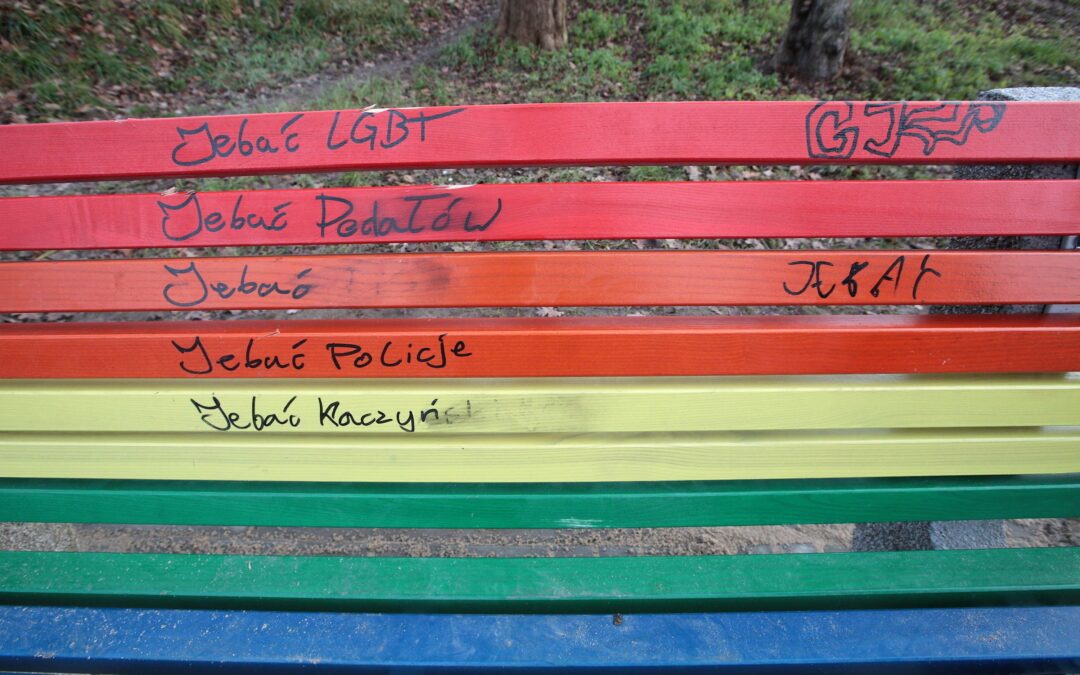A Polish city is considering withdrawing its recently installed rainbow-coloured benches after they were repeatedly vandalised within days of appearing. The local dispute echoes national disputes over LGBT issues in Poland in recent years.
Fifteen benches painted in the colours of the LGBT rainbow flag were erected in various locations in Kielce, a city of almost 200,000 people in south-central Poland, in December.
The benches, which cost 130,000 zloty (€29,000) to install, were one of the initiatives of the 2019 civic budget, a public consultation in which residents can help decide how municipal money is spent. Almost 1,300 citizens of Kielce voted in favour of funding the benches.
Kielce. Zdewastowane tęczowe ławki. Tylko zastanawiam się, co niektórzy ludzie mają pod czerepem, zestawiając ludzi LGBT z PiS-em, policją, Kaczyńskim, kiedy to PiS i Kaczyński są wrogiem numer jeden społeczności LGBT (z Konfederacją czającą się już na tylnym siedzeniu). pic.twitter.com/CQ1aEqJWCO
— Nikodem Bansleben (@thisisbans) December 24, 2020
Yet the project also drew opposition from the start, reports Polsat News. Critics – including some local officials and politicians – described it as a “provocation”.
The head of Kielce’s city council, Kamil Suchański, said that the benches were not “neutral in terms of worldview”, adding that the civic budget was “supposed to unite residents, not divide them”.
The issue also attracted comment from nationalist politician Krzysztof Bosak, who stood as a presidential candidate for the far-right Confederation (Konfederacja) party last year. He tweeted a picture of the proposed benches, noting that they were being erected in “rather conservative” Kielce.
W raczej konserwatywnych Kielcach poprzez budżet obywatelski został wprowadzony projekt budowy kilkudziesięciu takich ławek pic.twitter.com/l80LcErNHy
— Krzysztof Bosak 🇵🇱 (@krzysztofbosak) October 31, 2019
At the opposite end of the political spectrum, Robert Biedroń – who was The Left’s presidential candidate – praised the idea as “super”. He also added a plea to potential vandals: “a bench is just a bench – only prettier, because it’s colourful. If you don’t want to, don’t sit down. But don’t destroy it!”
Such pleas went unheeded. The night after the first four benches were installed in December, vulgar messages were written on one, which was also damaged with a knife. Later, the back of the bench was removed and thrown into an adjacent reservoir.
Other benches were also vandalised in the following days, reports TVP Info. At least two were repainted in the colours of the city’s football team, Korona Kielce, whilst somebody tried to set another on fire, reports Gazeta Wyborcza.
Już pływają w stawie
Kielce rulllezzzhttps://t.co/zqy1La30hy
— van Dogh CK 💯 🇵🇱 (@VanDoghCK) December 20, 2020
The local organisation responsible for the project quickly removed the graffiti, and LGBT organisations condemned the vandalism.
Barbara Biskup and Artur Stawecki of the Prowincja Równości (Province of Equality) association said the reaction to the benches showed “us, citizens of Kielce, that we cannot feel safe in our own city”.
Agata Wojda, head of the Civic Coalition (KO) – a centrist group who are the main national opposition – on Kielce city council, called on the mayor, Bogdan Wenta, to “give a clear signal and oppose the evil that is starting to spread in our city”.
Wenta announced that he “strongly condemned any act of vandalism committed in the city”, adding that “Kielce is open to everyone”. He also said that efforts were ongoing to find out who was responsible for the damage.
However, with the benches being repeatedly vandalised, some local politicians have suggested that the project should be abandoned.
Dariusz Kisiel, a councillor from Law and Justice (PiS), Poland’s conservative national ruling party, proposed that the city either dismantle or repaint the benches to limit acts of vandalism and thereby save funds, reports Gazeta Wyborcza.
Aleksandra Woźniak-Czaplarska, from the city’s economy and environment department, told the newspaper that the benches may simply become too expensive to maintain.
“There is a certain discomfort that vandals might determine what our infrastructure looks like,” she admitted. “However, we also need to look at this from a budgetary and cost point of view. It is not so much submission to vandalism as a practical approach to the budget and finances.”
Since early 2019, PiS has led a vocal campaign against what it calls “LGBT ideology”, claiming that a dangerous set of ideas is being imported into Poland, threatening Polish families, culture and even the nation itself.
A number of local authorities – usually under the control of PiS – have passed resolutions declaring themselves “free from LGBT ideology”. There have also been attempts, often by mayors linked to KO, to ban LGBT parades on public safety grounds, and some such marches have faced violent attacks.
Last year, Poland was ranked as the worst country in the European Union for LGBT people in the annual “Rainbow Map” produced by ILGA-Europe, a Brussels-based NGO that advocates for the rights of LGBT people.
Main image credit: Pawel Malecki / Agencja Gazeta

Juliette Bretan is a freelance journalist covering Polish and Eastern European current affairs and culture. Her work has featured on the BBC World Service, and in CityMetric, The Independent, Ozy, New Eastern Europe and Culture.pl.




















